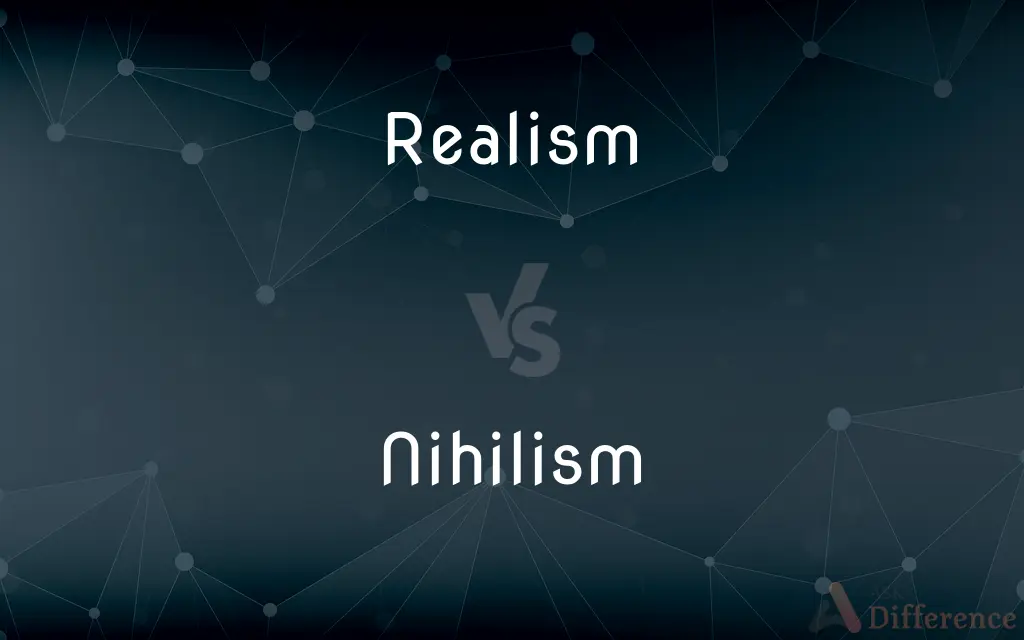Realism vs. Nihilism — What's the Difference?
By Urooj Arif & Fiza Rafique — Updated on March 29, 2024
Realism emphasizes the representation of reality as it is, while nihilism suggests that life lacks intrinsic meaning, value, or truth.

Difference Between Realism and Nihilism
Table of Contents
ADVERTISEMENT
Key Differences
Realism, in philosophy, literature, and art, focuses on depicting subjects as they appear in everyday life, without embellishment or interpretation. In contrast, nihilism is a philosophical doctrine suggesting that life has no inherent meaning, value, or purpose.
While realism aims to ground our understanding of the world in the observable and the factual, portraying life with fidelity to its processes and conditions, nihilism questions the very foundations of meaning and value in existence. Realism, therefore, often encourages engagement with the world as it is, advocating for an understanding and acceptance of reality's constraints and opportunities. Nihilism, on the other hand, can lead to a detachment or rejection of societal norms and conventions, proposing that since nothing truly matters, all attempts to find or ascribe meaning are futile.
In the context of art and literature, realism is manifested in detailed and accurate depictions of everyday life, focusing on characters, settings, and situations that are relatable and recognizable. Nihilistic themes in art and literature, however, explore the absence of meaning in life, the arbitrary nature of societal structures, and often portray a skeptical or pessimistic view of traditional values and beliefs.
The philosophical underpinnings of realism involve the belief in an objective reality that can be known, to some extent, through human experience and perception. It asserts that the world exists independently of our thoughts and perceptions. Nihilism, conversely, often leads to existential questioning, arguing that if life has no predetermined purpose or inherent value, then individuals are free to ascribe their own meaning to their existence, albeit within a framework that recognizes the inherent meaninglessness of life.
The dialogue between realism and nihilism represents a spectrum of thought concerning the nature of reality, the search for truth, and the meaning of life. Where realism finds value in the accurate representation and engagement with the tangible aspects of existence, nihilism confronts the existential void, challenging individuals to find or create meaning in a world it views as inherently devoid of it.
ADVERTISEMENT
Comparison Chart
Definition
Focus on depicting reality as it is.
Belief that life lacks intrinsic meaning, value, or truth.
Philosophical Focus
Representation of the observable world.
Questioning of objective morality and truth.
In Art & Literature
Accurate depiction of everyday life and situations.
Exploration of meaninglessness and skepticism.
View on Reality
Believes in an objective reality knowable through perception.
Challenges the very notion of objective reality or meaning.
Impact on Individuals
Encourages engagement with the tangible world.
Prompts existential questioning and freedom to ascribe personal meaning.
Compare with Definitions
Realism
Realism emphasizes the accurate depiction of everyday life.
The novel's detailed portrayal of working-class life exemplifies realism.
Nihilism
Freedom to create one's own meaning in a meaningless world.
For a nihilist, choosing a career path is an exercise in personal meaning-making.
Realism
Realism in literature focuses on character development and everyday events.
George Eliot's Middlemarch explores complex characters in a realist setting.
Nihilism
The belief that life has no inherent purpose or value.
Nihilistic literature often portrays characters grappling with the absence of meaning.
Realism
In art, realism is the precise, detailed portrayal of life.
Realist painters like Gustave Courbet depicted ordinary scenes with meticulous detail.
Nihilism
Nihilism often critiques societal norms and values.
Nihilistic philosophy may challenge the significance of traditional rituals or achievements.
Realism
Belief in an objective reality that is knowable.
Scientific research, grounded in realism, seeks to uncover universal truths through observation.
Nihilism
Challenges the existence of objective moral values.
Nihilism questions whether acts of kindness are inherently good or just socially constructed.
Realism
The philosophical stance that reality exists independently of perception.
In realism, the physical laws of the universe are considered objective truths.
Nihilism
Doubts about the existence of universal truths.
A nihilist may argue that what we consider truth is merely a construct of human perception.
Realism
An inclination toward literal truth and pragmatism.
Nihilism
Nihilism (; from Latin nihil 'nothing') is a philosophy, or family of views within philosophy, expressing negation (i.e., denial of) towards general aspects of life that are widely accepted within humanity as objectively real, such as knowledge, existence, and the meaning of life. Different nihilist positions hold variously that human values are baseless, that life is meaningless, that knowledge is impossible, or that some set of entities do not exist, are meaningless, or pointless.The study of nihilism may regard it as merely a label that has been applied to various separate philosophies, or as a distinct historical concept arising out of nominalism, skepticism, and philosophical pessimism, as well as possibly out of Christianity itself.
Realism
The representation in art or literature of objects, actions, or social conditions as they actually are, without idealization or presentation in abstract form.
Nihilism
(Philosophy) The doctrine that nothing actually exists or that existence or values are meaningless.
Realism
The scholastic doctrine, opposed to nominalism, that universals exist independently of their being thought.
Nihilism
Relentless negativity or cynicism suggesting an absence of values or beliefs
Nihilism in postwar art.
Realism
The modern philosophical doctrine, opposed to idealism, that objects exist independently of their being perceived.
Nihilism
Political belief or action that advocates or commits violence or terrorism without discernible constructive goals.
Realism
A concern for fact or reality and rejection of the impractical and visionary.
Nihilism
Also Nihilism A diffuse, revolutionary movement of mid-19th-century Russia that scorned authority and tradition and believed in reason, materialism, and radical change in society and government through terrorism and assassination.
Realism
An artistic representation of reality as it is.
Nihilism
(Psychiatry) A delusion, experienced in some mental disorders, that the world or one's mind, body, or self does not exist.
Realism
(sciences) The viewpoint that an external reality exists independent of observation.
Nihilism
The view that all endeavours are devoid of objective meaning.
Existential nihilism
Realism
(philosophy) A doctrine that universals are real—they exist and are distinct from the particulars that instantiate them.
Nihilism
The rejection of, or opposition to, religious beliefs, (inherent or objective) moral principles, legal rules, etc., often due to the view that life is meaningless (sense 1).
Moral nihilism
Realism
As opposed to nominalism, the doctrine that genera and species are real things or entities, existing independently of our conceptions. According to realism the Universal exists ante rem (Plato), or in re (Aristotle).
Nihilism
The rejection of non-proven or non-rationalized assertions in the social and political spheres of society.
Realism
Fidelity to nature or to real life; representation without idealization, and making no appeal to the imagination; adherence to the actual fact.
Nihilism
A delusion that oneself or the world, or parts thereof, have ceased to exist.
Realism
The practise of assessing facts and the probabilities of the consequences of actions in an objective manner; avoidance of unrealistic or impractical beliefs or efforts. Contrasted to idealism, self-deception, overoptimism, overimaginativeness, or visionariness.
Nihilism
Alternative case form of Nihilism
Realism
The attribute of accepting the facts of life and favoring practicality and literal truth
Nihilism
A doctrine grounded on the negation of one or more meaningful aspects of life; in particular, the view that nothing in the world actually exists.
Realism
(philosophy) the philosophical doctrine that physical object continue to exist when not perceived
Nihilism
(countable) Something that is regarded as meaningless.
Realism
The state of being actual or real;
The reality of his situation slowly dawned on him
Nihilism
Nothingness; nihility.
Realism
An artistic movement in 19th century France; artists and writers strove for detailed realistic and factual description
Nihilism
The doctrine that nothing can be known; scepticism as to all knowledge and all reality.
Realism
(philosophy) the philosophical doctrine that abstract concepts exist independent of their names
Nihilism
The theories and practices of the Nihilists.
Nihilism
A revolutionary doctrine that advocates destruction of the social system for its own sake
Nihilism
The delusion that things (or everything, including the self) do not exist; a sense that everything is unreal
Nihilism
Complete denial of all established authority and institutions
Common Curiosities
What distinguishes realism from nihilism in philosophy?
Realism emphasizes the objective existence and understanding of the world, while nihilism denies inherent meaning or value in life.
Can realism and nihilism coexist in an individual's worldview?
While seemingly contradictory, an individual might employ realism in understanding the tangible aspects of the world and nihilism in questioning the underlying meaning or value of existence.
Does nihilism always lead to pessimism or despair?
Not necessarily; while nihilism recognizes life's inherent lack of meaning, it can also offer freedom to individuals to create their own purpose.
Is realism limited to physical or observable phenomena?
Primarily, yes. Realism is concerned with representing the physical world and human experiences as accurately as possible, often focusing on observable phenomena.
Are there positive aspects to a nihilistic viewpoint?
Yes, nihilism can encourage a sense of freedom and personal responsibility in ascribing one's own meaning to life, challenging traditional constraints.
Can a nihilistic perspective lead to social change?
Potentially, since questioning traditional values and norms can inspire individuals and societies to reconsider and redefine what is truly meaningful.
How do realism and nihilism influence art and literature?
Realism in art and literature focuses on accurate depictions of life, whereas nihilism influences themes of meaninglessness and the rejection of traditional values.
How does nihilism impact an individual's search for meaning?
Nihilism can initially lead to disillusionment, but it also offers an opportunity for individuals to find or create personal meaning in a universe it perceives as devoid of inherent purpose.
How do realists respond to nihilistic arguments about the absence of objective reality?
Realists might argue that the consistent and predictable nature of the physical world provides sufficient evidence for an objective reality, even if our understanding of it is limited or flawed.
In what ways does realism contribute to our understanding of human experience?
Realism offers insights into the complexities, struggles, and beauty of everyday life, fostering empathy and a deeper appreciation for the human condition.
Share Your Discovery

Previous Comparison
Ambition vs. Aspiration
Next Comparison
Chinch vs. CinchAuthor Spotlight
Written by
Urooj ArifUrooj is a skilled content writer at Ask Difference, known for her exceptional ability to simplify complex topics into engaging and informative content. With a passion for research and a flair for clear, concise writing, she consistently delivers articles that resonate with our diverse audience.
Co-written by
Fiza RafiqueFiza Rafique is a skilled content writer at AskDifference.com, where she meticulously refines and enhances written pieces. Drawing from her vast editorial expertise, Fiza ensures clarity, accuracy, and precision in every article. Passionate about language, she continually seeks to elevate the quality of content for readers worldwide.
















































